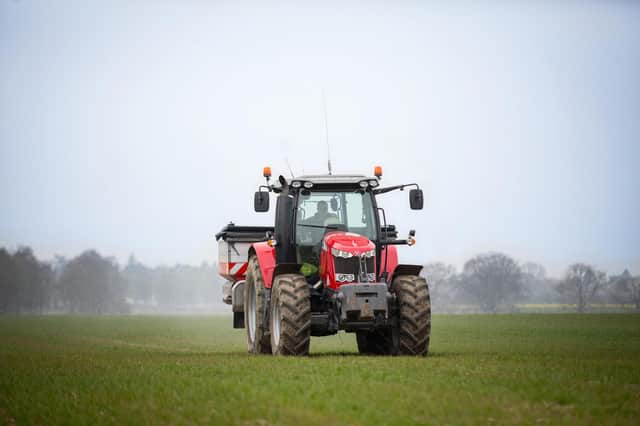Rising fertiliser prices bring a safety warning for farmers


But while growers look an aghast as ammonium nitrate prices rise beyond £700 a tonne, a warning has also been issued to those lucky enough to have bought stock earlier in the year before sky-rocketing gas prices saw production of fertilisers slow and costs rise.
And the Agricultural Industries Confederation (AIC) has reminded farmers about their responsibilities to store fertiliser safely and securely.
Advertisement
Hide AdAdvertisement
Hide AdThis is not only to avoid theft in the face of the rising price of the product but also to highlight farmers’ duty to stop potentially explosive ammonium nitrate falling into the hands of criminals and terrorists.
Roberta Reeve, technical manager of Fertiliser Industry Assurance Scheme said that while growers who didn’t have sufficient stock or orders in the pipeline to cover their needs could be affected by disruptions to the fertiliser supply chain - which she said could continue into spring 2022 - another area of concern was the fact that on-farm stocks could act as a target for thieves.
“While light-hearted comments on social media about selling excess stock of fertiliser may appear harmless, this may draw attention of the situation to criminals,” warned Reeve.
But she also reminded growers that there was a risk of nitrogen-based fertilisers being used for illegitimate purposes.
“Anyone handling or storing these products has a responsibility to provide secure storage and to remain vigilant to potential theft,” she added.
And she added that while some growers might be tempted to cash in on the increase in prices and sell fertiliser rather than use if to grow crops, it had to be done through proper channels – and this meant via a return to the original supplier for refund or re-sale.
“It is illegal to sell ammonium nitrate without the correct documentation and fertilisers should not be advertised on auction sites, local trade magazines or social media,” she warned.
She further reminded farmers not to purchase fertiliser unless the source was known and the correct documentation was available.
Advertisement
Hide AdAdvertisement
Hide AdNFU Scotland cropping policy manager, David Michie confirmed the message that it was illegal to re-sell fertiliser without the correct documentation – and, admitting that this might take the shine off such an approach, he stressed it was important to abide by the law.
“Everyone in the industry should be alert to the potential mis-use and mis-sale of nitrogen-based fertiliser by reporting suspicious activity or sales to the police.”
He added that where farmers were carrying stocks, it was important to follow the National Counter Terrorism Security Office’s five point plan for secure storage.
That includes keeping the product in a secure area such as a building or sheeted, away from public view and that regular stock checks should be carried out with any loss reported to the police immediately.
Comments
Want to join the conversation? Please or to comment on this article.